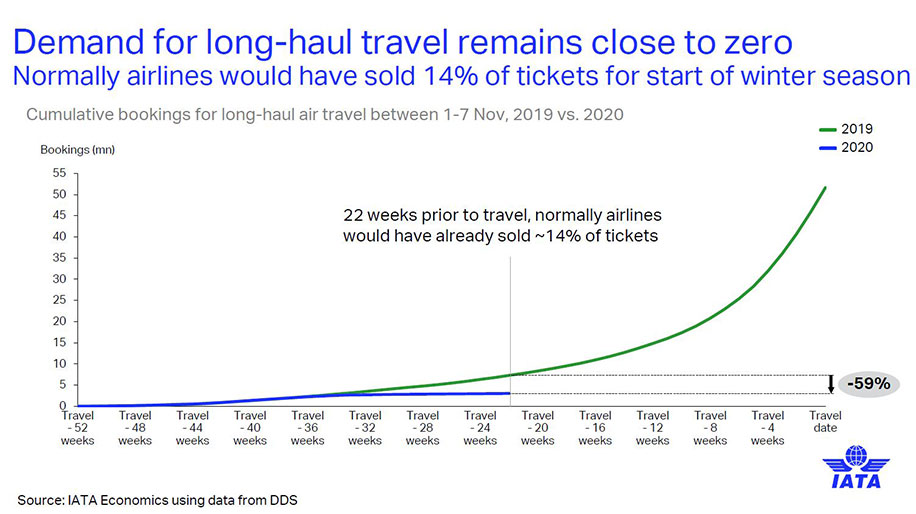
Airline industry body the International Air Transport Association (IATA) says that demand for long-haul travel remains close to zero even as short haul flying returns.
It said that forward bookings for long haul travel are almost non-existent, and if anything, the public is becoming more pessimistic about their prospects for travel.
IATA said that “current bookings for 1-7 November show that tickets have been sold to only 5 per cent of the 2019 number of passengers”.

In addition, public opinion research in the first week of June 2020 showed greater caution among travellers in returning to travel, with only 45 per cent of travellers surveyed intending to return to the skies within a few months of the pandemic subsiding. A further 36 per cent said that they would wait six months.
“The re-start is anything but a normal situation for airline planning or passenger demand,” said Alexandre de Juniac, IATA’s Director General and CEO. “Forward bookings into the autumn period are down 82 per cent on normal levels”.
IATA says that public sentiment has seen “a significant shift from April 2020 when 61 per cent said that they would return to travel within a few months of the pandemic subsiding and 21 per cent responded that they would wait about six months.”
IATA is calling for governments to continue to waive rules on flight slots to allow airlines maximum flexibility in booking their future schedules. The reason, according to IATA, is that with little or no visibility of future demand, airlines should not be forced to relinquish slots, since this would mean many routes would be lost and perhaps not return.
Although point-to-point traffic is important for business travellers, some 94 per cent of city pairs are via hubs, and it is these routes which are under threat if valuable slots during morning ‘flight banks’ at the hubs are disrupted, according to IATA.
The call from IATA is for an extended waiver on what is known as the “80:20 slots rule”. This rule says that airlines must use a slot for at least 80 per cent of the time under a ‘use it or lose it’ idea.
“In these extraordinary times, airlines need much more flexibility to plan schedules and business critical decisions should not be compromised by slot allocation guidelines designed for normal times. There were good reasons why the 80-20 rule was waived for the summer season. Regulators should apply the same common-sense approach again and waive the rule for the winter season as well. Airlines need to focus on meeting what consumers want today, without trying to defend the slots needed for what their schedule might look like a year from now,” said de Juniac.

IATA also repeated its opposition to quarantines imposed by governments such as the UK.
“Quarantine is a major deterrent for air travel. It’ a blocking mechanism not only for tourism but also for business travel.”
Instead IATA is promoting the International Civil Aviation Organization’s (ICAO’s) global guidelines for restoring air connectivity.
Entitled Takeoff: Guidance for Air Travel through the COVID-19 Public Health Crisis (Takeoff), IATA says it is an “authoritative and comprehensive framework of risk-based temporary measures for air transport operations during the COVID-19 crisis”
“We are counting on governments to implement the recommendations quickly, because the world wants to travel again and needs airlines to play a key role in the economic recovery. And we must do this with global harmonization and mutual recognition of efforts to earn the confidence of travelers and air transport workers,” said de Juniac.
The Takeoff guidelines propose a phased approach to restarting aviation and identify a set of generally applicable risk-based measures including:
- Physical distancing to the extent feasible and implementation of “adequate risk-based measures where distancing is not feasible, for example in aircraft cabins”;
- Wearing of face coverings and masks by passengers and aviation workers;
- Routine sanitation and disinfection of all areas with potential for human contact and transmission;
- Health screening, which could include pre- and post-flight self-declarations, as well as temperature screening and visual observation, “conducted by health professionals”;
- Contact tracing for passengers and aviation employees: updated contact information should be requested as part of the health self-declaration, and interaction between passengers and governments should be made directly though government portals;
- Passenger health declaration forms, including self-declarations in line with the recommendations of relevant health authorities. Electronic tools should be encouraged to avoid paper;
- Testing: if and when real-time, rapid and reliable testing becomes available.
“This layering of measures should give travellers and crew the confidence they need to fly again. And we are committed to working with our partners to continuously improve these measures as medical science, technology and the pandemic evolve,” said de Juniac.












